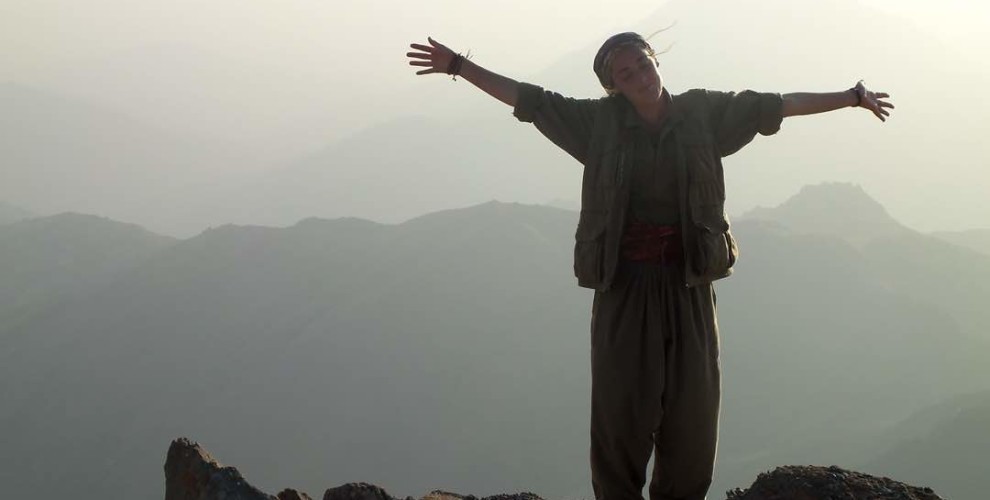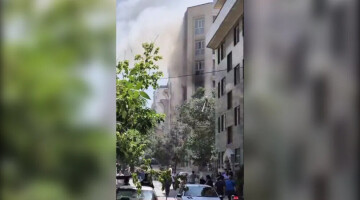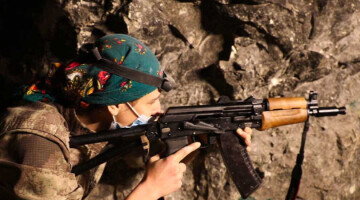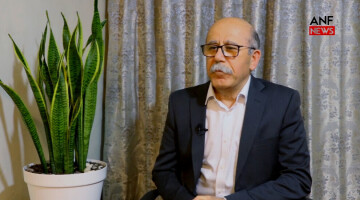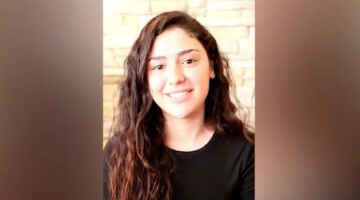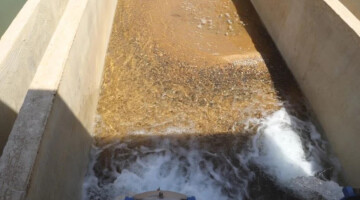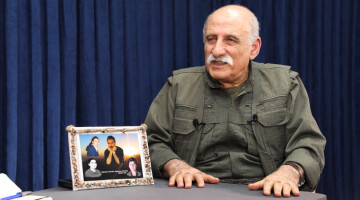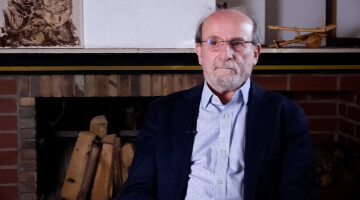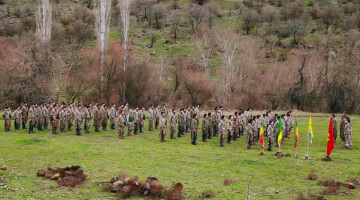Those who have known her remember her with love, for her passion to think and build a better world and to pass on that energy to every man and woman she met in a search that has not ended yet.
Alina, born in Argentina in 1986, got her medical degree in Cuba and in 2011 she began to approach the struggle of the Kurdish people that would end up defining her character and her future. In the past few years, she had been living in Rojava, with the task of reorganizing the health system of that territory in northern Syria, which declared its autonomy in 2012.
On March 17, while traveling by car to the city of Haseke to meet with non-governmental organizations, she suffered an accident and lost her life.
From the deepest memory, in Latin America, Alina is remembered with stories, encounters, desires and dreams that, as she sought, aim for a fairer world.

Meeting in Havana
A typical day in the city of Havana, Cuba. Emilia Rojo is sitting alone, after participating in the organisations of the activities for International Women's Day. Until someone spoke to her. It's Alina, with whom, from that moment, they became inseparable friends despite the distance. "We talked for a while and she told me that she had returned to Cuba after traveling. That was the first time I heard about the existence of Kurdistan," Emilia recalls.
Emilia, who is also a doctor, holds her friend in high consideration, especially after listening to her talk about the Kurdish people's struggle. "The encounter with the Kurdish political proposal and its path of deconstruction of patriarchy undoubtedly marked us," she says.
Alina and Emilia lived together in Cuba while they studied. They also gave each other the time to tour the Caribbean island, which in 1959 experienced a revolution that impacted all over the world. "She was a simple, affectionate, super expressive woman. She brought any everyday experience to a more reflective chat. She questioned her practices continuously, she demanded a lot from herself and this made us question ourselves who lived with her”, her friend emphasizes.
“Among her qualities I highlight her capacity for dialogue, to insist and practice building out from the common points with the other, and not from the differences, or from a reduced perspective of reality," adds Emilia.

Living life
Serhed Chaco has known Alina closely. They shared talks in Argentina on the subject of Kurdistan and moments in common, in which they forged a strong friendship.
"I think the main thing about her is the humanity with which she dealt with everything," says Serhed. And he adds: "Lêgerîn was not siding with the issue of Kurdish women just like this, it was because of an incredible sensitivity, a tenderness with which she lived and expressed herself in life every second".
For Serhed, her friend and companion "was a very sensitive person with anyone she was meeting. She was ready to always speak freely, without judgment and all the time ready to reflect on what was being lived. That speaks of a person free of oppression and free in her soul. She had a soul, a spirit, a truly free body, not just her mind. "
Chaco remembers a letter he received from Alina, where she talks about life, the future, challenges. In that letter, Alina tells about her learning to "disperse my tiny and omnipresent privileges." In those lines, Alina also says that her challenge is "to feel every little thing as the only inhabited of life, in my life".

A social and humanitarian health
Daniel Maraz is a doctor in solidarity with the Kurdish cause. A few weeks ago he was in Europe participating in the great mobilization held to ask for the freedom of Abdullah Öcalan, the Kurdish leader imprisoned since 1999 in Turkey.
Daniel met Alina through a friend from Kurdistan. From that moment, they began to talk about several issues that had Kurdistan as a central point. Likewise, the issue of health was always present in their talks.
"We had very long talks on the subject of health," recalls Daniel. We were working and coordinating a project to develop in Rojava. Our longer talks were always on how to discourage the doctor from his comfort position and make him having a more social and more humanitarian look."
Referring to the project, Daniel explains that the central idea was "to organize internationalist solidarity through health, from doctors, health care, involving different professionals who wanted to offer their solidarity, open their hearts to humanitarian aid and offer their work to a people who needs it."
After much time shared with Alina, Daniel remembers her as always active and spreading the struggle of the Kurdish people. "She was very committed, to such an extent that she gave her life to spread that until the last moment," he says.
Among the most vivid memories, Daniel points to the talks "to find a way to reach the medical and health professional world, and achieve that doctors leave the comfort of their work and their scope to be open to the needs of the peoples. Those were the talks that took us the longest and that united us the most in thinking about how to look for that sensitivity in health."

Memories from Colombia
Vilma Rocío Almendra Quiguanás is an indigenous Nasa-Misak, from the Cauca region, in Colombia. Vilma met Alina in June 2017, during a meeting held in the city of Pasto. "That was the first time we felt each other, we embraced, we loved each others as companions, sisters, friends, accomplices that we kept weaving in every word, laughter, dance," she recalls.
Although she met Alina just a few months ago, Vilma explains that in the "memory in permanent struggle" they actually had met “forever”.
From that meeting in Colombia, Vilma rescues the shared conversations "anywhere", whether it was a bus, a taxi, in a bar or in the streets. "We were always thinking about the peoples and Alina remarked the ways of weaving us from the matriarchal, the way this would counter death projects, from the autonomy as a daily verb to feed the whole life", says Vilma.
“In all of us, she marked a rhythm with her word, look and smile, because while she talked about the history of struggle in Kurdistan, the Women's Revolution, the way they continue to put their chest to war to free themselves by liberating society, of the Jineologî, we felt that she sang to us in our ear, stirring our thoughts ", she says.
Vilma wonders what she would say to Alina today. Her answer is deep: "We are going to do the impossible so that your word and path as a libertarian live-expression against the patriarchy are a permanent presence, to fill us with freedom until we are completely convinced that capitalism can not be destroyed without destroying the State and that the State can not be destroyed without destroying the patriarchy."

A river between rocks
From Guatemala, Sergio Palencia, sociologist, researcher of the war in Guatemala and the struggles of resistance of the people, also remembers Alina.
On March 11, he wrote her a message asking her how she was, because the Turkish invasion of Afrin was already underway.
Sergio returns to the moment he met Alina and says: "At the beginning, when I first met her, I did not understand why she used the first plural person, us, to refer to the organization of women in the Rojava Revolution with her Argentine accent. Little by little she showed it to me and I begun leaving the world of appearances," says Sergio.
From those days, where they shared talks and experiences, Sergio remembered the moment when "we would all participate in the minga [strike], from the experience of our peoples: you from the war and resistance in Kurdistan, us from the war and resistance in Guatemala."
According to Sergio, Alina talked “like a river among rocks, a thought of concrete flow". In one of the shared talks, he remembers the words of the Argentine doctor: “We, the women, know enough about violence. Many feminist movements have made efforts to classify and reclassify ... In our movement of Kurdish women it is done in a different way. Let’s avoid violence to be reduced to victimization. When we analyze ourselves one by one we question in experience, being, emotions, we analyze the violence in the woman fighter.”
As last words, Sergio refers to Alina's work as a doctor: "The horizon of the healing to which she dedicated herself is so much reality as a metaphor, and vice versa. We are cured by her love for life, that cannot be taken away from the Erdogans of history."

Knowing us forever
Emmanuel Rozental, from Pueblos en Camino, from Colombia, says that when he met Alina he knew that "we had known each other forever".
Alina, according to Emmanuel, "was not and is not for any of us the past, something finished, something done".
Around her, he explains, "we all find ourselves in the search, in the future, in the challenges and in the questions."
Emmanuel remembers that together with a group of comrades, among which was Alina, they planned to hold a meeting of women who, after a few days, would open to the participation of men.
"We not only agreed to it but excited and enthusiastic we are already working on that," he explains.
Finally, he says that in the moments shared with Alina they talked about "the doubts, the anguish, the fatigue, to pour our hearts out to ourselves and give us strength, to give us energy."
***
“Truth seeker”, is the way the Women’s Protection Units (YPJ) remembered Alina in the statement with which they announced her death. "Comrade Lêgerîn had revolutionary thoughts and feelings that combined freedom and hope in the world," affirmed her comrades in struggle.
Alina filled Latin America with searches for truth, revolutionary thoughts, hope in the world, to walk together in the construction of an anti-patriarchal, egalitarian, solidarity and free world.
"Time is full of spirits. That is not possible, science says no! The mountains that embrace the clouds told me yes, that time is inhabited by spirits. They walk leaving footprints on the life that was and the one that comes. They stroke the wind with their hands; they dialogue with the past-present and the past-future, they tell stories; with their fingers they write shared and not shared secrets; they say that this is memory ". (Words from Juan Quilano from Panama to Alina, Ale, Lêgerîn).
Source: Lucrecia Fernández and Leandro Albani / ANF / Kurdistán América Latina

